Michigan's National Guard turns to dogs to help stop veteran suicide
Warning: This story includes details on suicide and suicide attempts and may be disturbing to some readers. If you're considering suicide, call the National Suicide Prevention Lifeline at 800-273-8255.
Sheldon Ewers laid on the floor of his bedroom with a loaded .40-caliber pistol pointed at his face.
A wave of depression had washed over him earlier that day in 2017. He felt so hopeless he decided to end his life. His wife and daughter were not home. His medical service dog, Roy, was asleep in the front living room of his Michigan home.
Ewers is a U.S. Navy veteran who later worked as a Michigan corrections officer. Experiences in both left him diagnosed with post-traumatic stress disorder, hypervigilance for threats around him and depression.
"I pushed (the gun) back in my throat as far as I could," Ewers said. "I don’t know how Roy knew but, he knew. He suddenly came running in, he put his paw on my face, started pawing at my hand and arm ... throwing himself on me to get me to pay attention to him. So I put the pistol down."
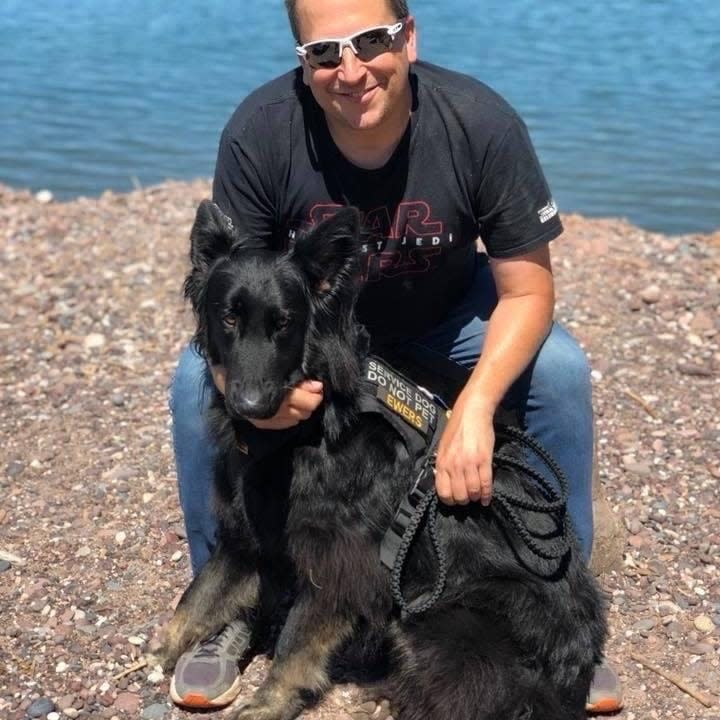
The dog persisted, pushing his body against Ewers' chest, forcing Ewers to let go of the gun and wrap his arms around Roy instead.
"Everything broke loose and I started to cry. He was literally licking the tears off my face," Ewers said. "I don’t remember how much time I was laying on the floor with him. But Roy literally and figuratively saved my life. I don’t have suicidal ideation anymore. All those thoughts and feelings were gone in that moment."
Ewers' shared his mental health struggles and how vital service dogs are in hopes of saving the lives of other veterans. To help, the National Guard Association of Michigan has recently launched the "54 by 24: Service Dogs Save Lives" campaign with a goal to raise $1.4 million by the summer of 2024. The money will cover the cost to train and place one service dog with one veteran in 54 U.S. states and territories. It costs $25,000 per dog.
In 2019, the most recent year of available data from the Department of Veterans Affairs, 6,261 veterans died by suicide, down by 399 compared with the prior year. It is a prodigious problem. Consider that the veteran suicide rate, on average, was 31.6 people per 100,000 people in 2019, according to the VA data. The suicide rate among non-veteran adults was 16.8 per 100,000.
There are thousands of military veterans, experts say, and therefore the need for service dogs is vast. Guardian Angels, a Florida-based group that trains and places dogs with veterans and is working on the "54 by 24" campaign, can get up to 40 contacts a day inquiring about a dog and most of them are from veterans, said Mary Lamparter, Guardian Angels' regional coordinator for Michigan.
There are other groups that pair dogs with veterans and Lamparter estimates 2,000 or more service dogs have been paired by various organizations over many years. There is no way of tracking it since there isn't a data bank of the information, but she said the use of service dogs goes back to right after WWI, when they were used to help blind veterans. To help broaden the service, Congress passed the Paws Act in 2021, which requires the VA to conduct a five-year pilot program on pairing service dogs with veterans with PTSD as part of its health programming.
"These animals go back a long way," Lamparter said. "However, PTSD is something relatively new and we, as a country, have only been educated in recent years about the many other issues veterans face. So there's no good answer for when dogs were used for our more recent issues."
The timing to raise the funds for the 54 dogs coincides with the National Guard's two annual conferences to be held in Detroit in August 2024. It is the first time both conferences will be in one city — bringing 7,000 members here, said Jeffrey Frisby, executive director for the National Guard Association of Michigan.
"Suicide is the No. 1 issue plaguing active and veteran members," Frisby said. "The Department of Defense is dumping millions of dollars in trying to combat this problem. We have discovered that organizations that provide service dogs to veterans ... have a 0% suicide rate. Every veteran we have matched with a service dog, they’re still alive."
Michigan's suicide problem
Frisby said the state's National Guard wants to help because, "as good tenants of this conference (in Detroit), it was on us to give back to the representatives coming from other states."
Since June 2019, there have been 115 attempted suicides and nine deaths by suicide among National Guard members in Michigan, Frisby said.
“We think these service animals are the answer," he said.
Frisby served three years in the Middle East in the early 2000s. He found it emotionally difficult to return to the U.S. between deployments. In war, a soldier relies on comrades for daily survival, personal choices are minimal and life and death decisions are made swiftly, he said. When returning to civilian life, some veterans struggle to cope with having no one to watch their backs and having to make even small daily decisions such as what to have for breakfast becomes stressful.
"All that freedom becomes overwhelming for some returning and there’s no way to fill that void, or for those around you to understand it," Frisby said. "It creates depression and thoughts of suicide. The service dog gives them the emotional attachment that they didn’t have since combat."
Frisby has recruited six other state National Guard associations to help raise money for the "54 by 24" campaign. The Vietnam Veterans of America, Chapter 9 in Detroit has committed to donate $25,000 to sponsor a dog, as has Selfridge Air National Guard Base in Harrison Township and Visit Detroit, Frisby said.
He is courting corporate interest, as well, seeking a dollar-to-dollar match for every donation. Software company MAK Technologies in Cambridge, Massachusetts, is planning events to raise $50,000 to donate one dog to a veteran in Massachusetts and another to a veteran in Florida, where the company has another location, MAK spokesperson Morgan McElroy said.
"We have a close partnership with the National Guard Association of Michigan, and we're proud to support its '54 by 24' campaign," said Bill Kamer, MAK's Army Program developer, in an email to the Free Press.
A veteran in Michigan has already been paired with a dog as part of the campaign through a grant to the National Guard Association of Michigan. The recipient, through Guardian Angels, declined to speak to the news media.
Meet the hero dogs
Ewers' German shepherd, Roy, is a Guardian Angels-trained dog. After he saved Ewers' life, the group awarded Roy with Dog Hero of the Year in 2017.

Ewers got Roy after he saw a service dog with another veteran at a VA hospital in Ann Arbor in 2015. "I asked him: 'Does the dog help?' We talked for a long time. He said, 'Yes, the dog has made living life a lot easier.' "
A year later, Ewers was paired with Roy.
Roy, 7, retired early due to a medical condition. He is now Ewers' pet. Guardian Angels paired Ewers with his current service dog Patsy, 3, also a German shepherd, in August 2020.
The Guardian Angels, which breeds 90% of its service dogs and uses rescue dogs for the balance, is working with the National Guard Association of Michigan in the campaign. Guardian Angels is about 11 years old, and, in that time, has paired 400 dogs in 29 states, most with veterans, said Lamparter.
“The dogs change lives and they save lives," Lamparter said. "Less than 2% of our recipients end in divorce. They are accepted back into the family life because they’re not angry all the time, they’re not sleep-deprived. We’ve never had a suicide among any of our recipients.”
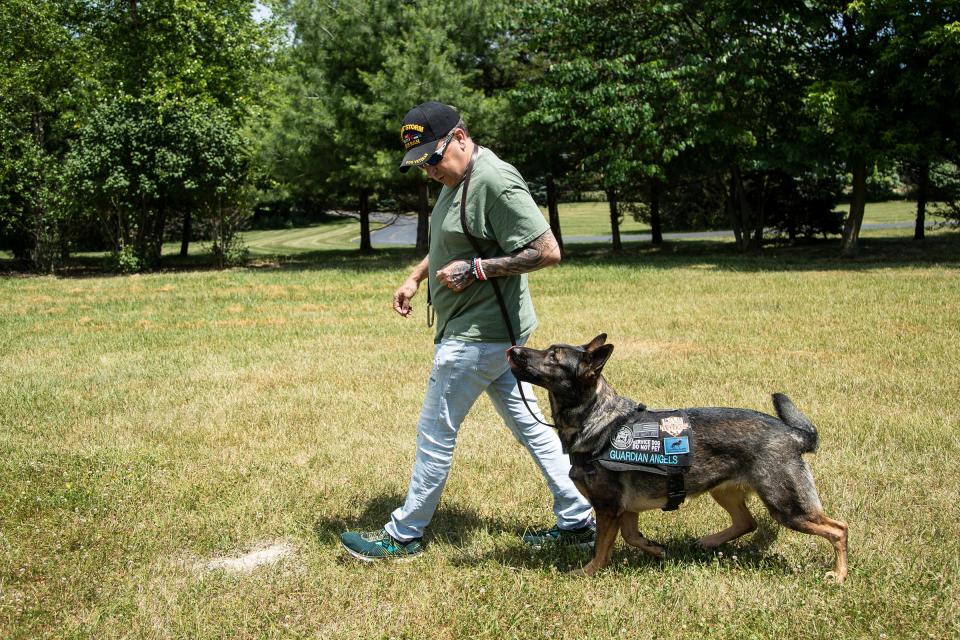
The application process for a dog is extensive and the applicant has to have a medical diagnosis showing a need for a dog, Lamparter said. But there is no cost to a recipient, she said.
Guardian Angels pays for the travel for the recipients to come to Florida to meet their dog and spend 10 days bonding with the dog, learning proper care and training. They practice by going on field trips to stores and restaurants with their dog.
The dogs are mostly German shepherds that start training at 3 weeks old, Lamparter said. They live with foster families for some time and are usually fully trained and paired with a person by 18 months of age. Those who don't make the cut, are available for adoption on www.medicalservicedogs.org for a minimum donation of $500.
Guardian Angels owns the dogs and monitors their ongoing welfare. The recipient is responsible to pay for food and care. A few years ago, Guardian Angels started its own medical insurance plan that costs a recipient $50 a month with a $300 deductible. It is mandatory to ensure affordable medical care for the dog.
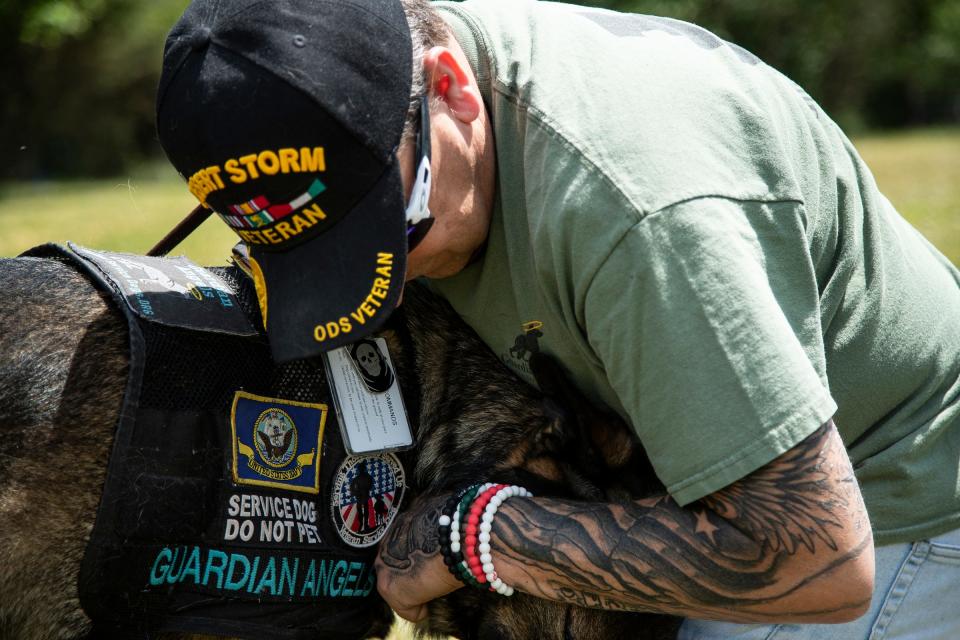
A service dog stays with a recipient until the dog dies or retires. There is a succession program to provide a home for a retiring dog and get the person a new service dog, Lamparter said.
"Which means we have to raise even more money to train more dogs for the successor program," she said.
The scent of distress
The dogs are trained to sniff out symptoms of PTSD, depression, panic attacks, anxiety and other afflictions, Lamparter said.
"Nightmares are a huge problem," Lamparter said. "We’ve had many recipients say, ‘I had my first good night's sleep’ because the dog wakes them up just enough to stop them from reliving that nightmare experience."
Also, many recipients dislike large crowds, so the dogs do shielding, which is placing itself between the person and others. The dog is trained to relax a person, often leaning against him or her to offset a panic attack.
The dogs also work with people who have traumatic brain injury, diabetes, seizures or mobility issues. For example, a dog can sense if a seizure is coming and alerts the person so the person can lay down and avoid injury. The dogs can open doors and deliver a water bottle from a refrigerator. Lamparter said one recipient has a panic button on the phone that the dog can hit with its paw to call 911.
Lamparter credits dogs' sense of smell for much of what they can do.
"With PTS and anxiety, we have a change of chemicals in our body," Lamparter said. "If we’re anxious or stressed, there’s a difference in the chemicals in our body and the dog knows the change and reacts."
A dog called Cat
Kate Melcher, 42, is a disabled veteran who lives in southeast Michigan. She declined to share her specific location or disability for the story, to protect her privacy. But Melcher served from 2005 to 2020 in the Army, training to fly an Apache helicopter, and working active duty at the Pentagon. She received her 5-year-old service dog, Cat, from Guardian Angels in March 2020. The moniker is short for the dog's full name: Catherine.
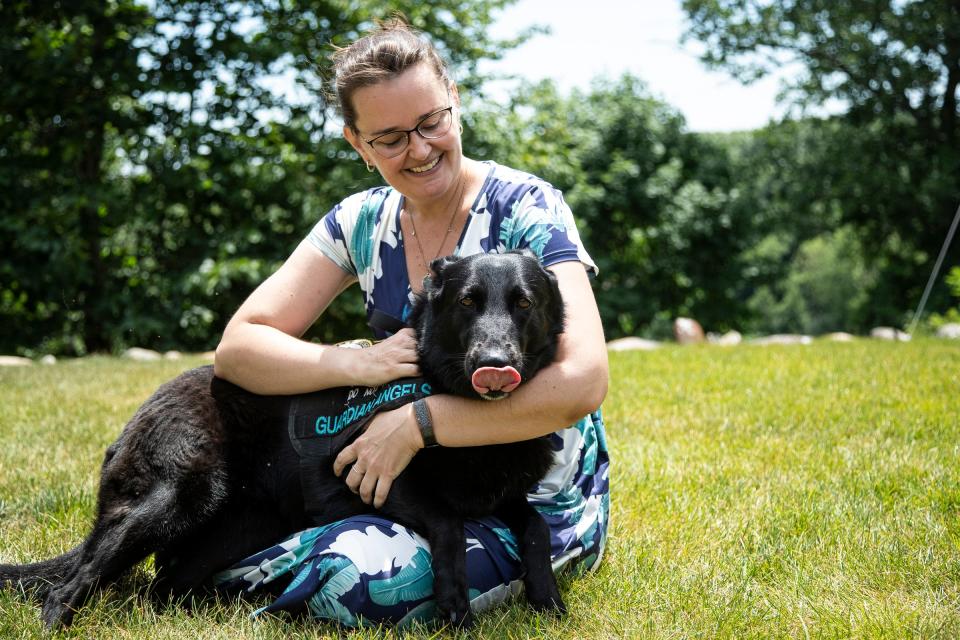
“I broke several bones in training accidents and I have trouble with balance so she helps me when I am getting off the floor or having balance issues," Melcher said. "She helps with social endurance. Cat actually takes on some of the emotional load from my work."
Melcher also said she was feeling burned out and stressed before she got Cat.
"I was not able to stay in crowded events or I would find reasons not to go," Melcher said. "I would have full-blown panic attacks and be dry heaving in my car. I didn’t have a life outside of work because I spent all my time recovering."
That's all improved with Cat by her side. Her dog even helps others. Melcher teaches knitting one night a week. Cat attends the class, but she is off duty.
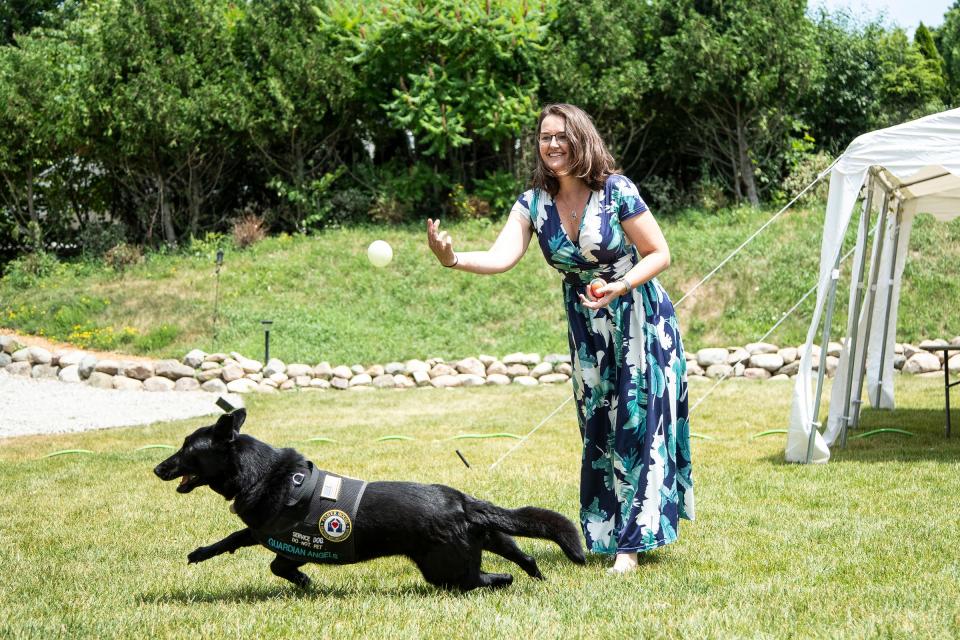
One night, Cat kept nudging the hand of one of Melcher's students who was a Type 1 diabetic. The student checked her monitor and it said her blood sugar was normal, but Cat wouldn’t leave her alone. So the woman manually tested her blood and found out she was having a low-blood sugar attack. Turned out, the monitor in that case was malfunctioning, but the dog was not.
"Cat was not trained for diabetes," Melcher said. "But she could still tell something was wrong."
Counting doors
Ewers, 50, now living in Jackson, joined the Navy in 1990 and was deployed to the Philippines a year later, arriving just days before Mount Pinatubo erupted. It was the largest volcanic eruption in the world in the last century, killing 840 people, according to the U.S. Department of Interior.
Ewers next went to Naval Station Guam and lived through the 1993 magnitude 8 earthquake where, he said, "My house actually collapsed as I was running out the door with my wife under my one arm and my infant daughter in the other."
Once out of the military in 1994, he got a job as a corrections officer at Ojibway Correctional Facility in Marenisco, in the Upper Peninsula near the Wisconsin border. The minimum security prison closed in 2018.
“I would describe working in prison as 99% boredom and 1% hell," Ewers said. "So is there stress? Yes. Because you don’t know when that 1% is going to happen.”
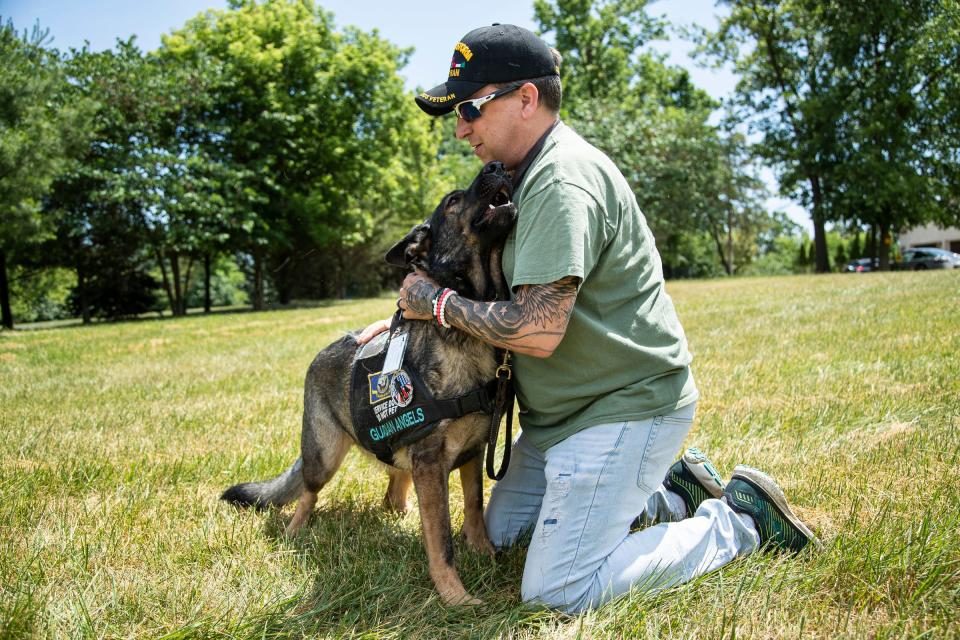
In April 2006, it happened. Ewers was on duty when a riot broke out. Several of his fellow officers were severely injured. He was unharmed on the outside, but inside, he was deeply wounded.
The trauma and devastation from the volcano and earthquake were one thing, the riot was on a different level.
"When you look at the rage coming at you and the hate, you’re looking death right in the eye," Ewers said. "You’re fighting for yourself and the person standing next to you. It’s scary. You think this could literally be the moment I’m about to die.”
He quit his prison job in 2010 and now works as a nurse for the Veterans Administration in Lansing. But the scars from the military experience and the prison riot left him with survivor's guilt, anger, nightmares and sleep deprivation, he said. He disliked going out in public or being in crowds.
"At the time I couldn’t stand between the racks in a checkout line, I felt I was trapped," Ewers said. "In a restaurant, I’d back myself up against a wall so that people couldn’t walk behind me where I couldn't see what they were doing. I would count doors so that I’d know how to escape. I was doing this everywhere I went."
Since his thwarted suicide attempt, he has managed his PTSD, depression and hypervigilance for threats with therapy and service dogs. In recent years, he has been able to discontinue medications for recurring nightmares and anxiety. He credits most of that to Roy and Patsy, he said.
"Patsy has never missed a step. She’s never let me down," Ewers said. "I can say without Guardian Angels, I wouldn’t be here. These dogs are valued at approximately $25,000 each because of their training. But what price do you put on a life saved? It’s just not possible."
Angels without wings
Ewers can't articulate exactly why Roy's actions that day in 2017 made such a profound impact on him.
Maybe it's Roy's selfless bravery for putting "himself in the way of death because of me," Ewers said. Or, maybe it's Roy's love and honesty in a dark moment.
“You can’t fool the dog," Ewers said. "If my family was home and I had got up and walked into the bedroom, they wouldn’t have thought anything of it. They would have responded to me when the gun went off. But Roy knew.”
Maybe it's Roy's loyalty and camaraderie.
"In the military, when you’re in a bad situation, you look to the person to your right and you know they’ve got my back and I’ve got theirs," Ewers said. "I look at my dog and I know they’ve got my back. I’m never alone."
Or maybe it's in an old saying Ewers often repeats to himself: “God said, ‘I will send them to Earth without wings, so that nobody knows that they’re angels.' ”
To donate to the "54 by 24" campaign, go to www.ngam.org/54-by-24 or email: executivedirector@ngam.org.
More: Before tragic Shockwave crash, I rode fastest semitruck on Earth: What it was like
More: A unique GM lab in Milford holds secrets to future EV driving here, and on the moon
Contact Jamie L. LaReau: jlareau@freepress.com. Follow her on Twitter @jlareauan. Read more on General Motors and sign up for our autos newsletter. Become a subscriber.
This article originally appeared on Detroit Free Press: Michigan's National Guard turns to dogs to help stop veteran suicide

